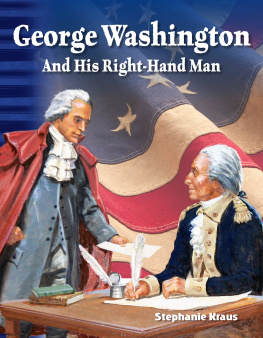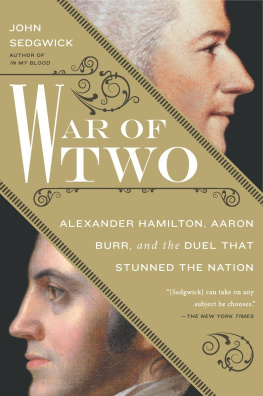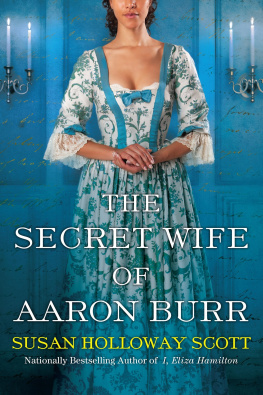Brian S. McGrath - Aaron Burr: More Than a Villain
Here you can read online Brian S. McGrath - Aaron Burr: More Than a Villain full text of the book (entire story) in english for free. Download pdf and epub, get meaning, cover and reviews about this ebook. year: 2017, publisher: Teacher Created Materials, genre: Politics. Description of the work, (preface) as well as reviews are available. Best literature library LitArk.com created for fans of good reading and offers a wide selection of genres:
Romance novel
Science fiction
Adventure
Detective
Science
History
Home and family
Prose
Art
Politics
Computer
Non-fiction
Religion
Business
Children
Humor
Choose a favorite category and find really read worthwhile books. Enjoy immersion in the world of imagination, feel the emotions of the characters or learn something new for yourself, make an fascinating discovery.
- Book:Aaron Burr: More Than a Villain
- Author:
- Publisher:Teacher Created Materials
- Genre:
- Year:2017
- Rating:5 / 5
- Favourites:Add to favourites
- Your mark:
- 100
- 1
- 2
- 3
- 4
- 5
Aaron Burr: More Than a Villain: summary, description and annotation
We offer to read an annotation, description, summary or preface (depends on what the author of the book "Aaron Burr: More Than a Villain" wrote himself). If you haven't found the necessary information about the book — write in the comments, we will try to find it.
Aaron Burr: More Than a Villain — read online for free the complete book (whole text) full work
Below is the text of the book, divided by pages. System saving the place of the last page read, allows you to conveniently read the book "Aaron Burr: More Than a Villain" online for free, without having to search again every time where you left off. Put a bookmark, and you can go to the page where you finished reading at any time.
Font size:
Interval:
Bookmark:
0covercover.xhtmlAaron Burr More Than a Villain Brian S. McGrathcover3page0003page0003.xhtmlConsultant Vanessa Ann Gunther, Ph. D. Department of History Chapman University Publishing Credits Rachelle Cracchiolo, M. S. Ed., Publisher Conni Medina, M. A. Ed., Managing Editor Emily R. Smith, M. A. Ed., Content Director Seth Rogers, Editor Robin Erickson, Senior Graphic Designer Image credits : Cover and p. 1 Bettmann/Getty Images; pp. 4, 22-23, 24-25 North Wind Picture Archives; p. 5 (top right) Photo by Leemage/Corbis via Getty Images; pp. 6, 10, 14-15, 15 (top left), 18 (bottom) New York Public Library Digital Collections; pp. 6-7 Library of Congress Prints and Photographs Division [LC-DIG-pga-03359]; p. 7 (top) Internet Archive; pp. 8-9 Illustration by Ed Vebell/Getty Images; p. 11 Library of Congress Geography and Map Division [gm71000864]; pp. 12-13 (bottom) Chicago History Museum, USA/Bridgeman Images, (top) MPI/Getty Images; p. 14 Chronicle/Alamy Stock Photo; p. 15 (top right) Library of Congress Rare Book and Special Collections Division; p. 16 American Antiquarian Society; p. 17 Peter Newark American Pictures/Bridgeman Images; p. 18 (top) Museum of the City of New York, USA/Bridgeman Images; pp. 19, 32, and Read and Respond page Sarin Images/Granger, NYC; p. 20 (top) Rembrandt Peale/ZUMA Press/Newscom, (bottom) Gilder Lehrman Collection, GLC00496. 028; p. 21 National Archives and Records Administration; pp. 25 (right and left), 26 Granger, NYC; p. 27 Photo by GraphicaArtis/Getty Images; p. 28 (left) United States Senate; p. 29 (top) Collection of the New-York Historical Society, USA/Gift of Dr. John E. Sitwell/Bridgeman Images; back cover Yale University Art Gallery, New Haven, CT, USA/Bridgeman Images; all other images from iStock and/or Shutterstock Teacher Created Materials 5301 Oceanus Drive Huntington Beach, CA 92649-1030 http : //www. tcmpub. com ISBN 978-1-4258-6355-5 2017 Teacher Created Materials, Inc. 244page0004page0004.xhtmlTable of Contents A Fateful Day 4 Ambitions 6 A New Life 14 Payback 20 Death in Weehawken 24 Burrs Legacy 28 Glossary 30 Index 31 Your Turn! 3255page0005page0005.xhtmlA Fateful Day On the morning of July 11, 1804, Vice President Aaron Burr stood on the shore of the Hudson River. He was in Weehawken, New Jersey. Across the river, the sun was rising over the farms and buildings of Manhattan. A small boat arrived on the shore at around seven. The distinguished lawyer and former secretary of the treasury, Alexander Hamilton, stepped out. With him were two gentlemen, one of them carrying a leather case. Inside the case were two dueling pistols. The duel was Burrs idea, so Hamilton chose which pistol he wanted to use. The men assumed positions, ten paces apart. On command, each man turned and raised his weapon. Two shots rang out, and Hamilton fell to the ground. Burr seemed surprised. Did he regret what he had done? He started toward the injured Hamilton but was pulled to his boat.66page0006page0006.xhtmlHamilton died the next day. The newspapers branded Burr a murderer. Ever since that day, he has been cast as one of historys villains. Was Burr really a villain? What events could have led the vice president to that rocky shore to take the life of one of the countrys Founding Fathers? Aaron Burr Alexander Hamilton dueling pistols He May Have Been the First Vice President Burr was not the only government leader to kill a man in a duel. In 1806, Andrew Jackson killed Charles Dickinson, who had insulted Jacksons wife. This didnt stop Jackson from being elected president in 1829! Home of the Brave There were a total of 16 duels in New York City between 1795 and 1807. The goal in a duel was not to kill or injure the opponent but instead to prove ones own bravery. Usually, simply the sound and smoke of fired pistols would end a dispute.77page0007page0007.xhtmlAmbitions Burr was born in Newark, New Jersey, in 1756. Orphaned at the age of two, Burr went to live with a wealthy uncle. His father and grandfather were ministers and college presidents. In those days, young men usually followed in their fathers footsteps. When Burr was 17, he graduated from the College of New Jersey, which is now known as Princeton University. His uncle sent him to Connecticut to study for ministry. His future seemed bright. Burr soon realized that he did not share the religious beliefs of his father. So in 1774, he changed professions. Instead, he studied to become a lawyer. This new path was not surprising. Burr was interested in issues such as immigrants rights and ending slavery. Princeton University The Preacher Burrs grandfather was a famous minister named Jonathan Edwards (above). Edwards preached of scary things such as pits of fire that would suddenly swallow up sinners. He led a religious movement that swept through the American colonies in the mid-1700s. This movement is known as the Great Awakening. School Days Burr did not get along with his uncle, who was very strict. He tried to run away more than once. When Burr was 10, he ran off to join the crew of a ship as a cabin boy. His uncle found him and took him back to continue his schooling.88page0008page0008.xhtmlNot all of Burrs decisions were so simple. The struggle between working for the common good and satisfying his own ambition was a theme in Burrs life. He tried to work for the good of his country, but he also wanted to make a name for himself. He craved the respect and admiration of his peers. Aaron Burrs birthplace99page0009page0009.xhtmlThe Brave Soldier In April 1775, British troops marched to a farm in Concord, Massachusetts. Their mission was to seize weapons. The British came to a bridge when suddenly colonial minutemen fired muskets from behind trees. They chased the Redcoats back to Boston. The American Revolution had begun. Burr rushed to Massachusetts. General George Washington was creating the new Continental Army. Burr was ready to join the fight for freedom. Burrs military career began with great promise. At the age of 19, he was part of Benedict Arnolds invasion into Canada. Arnold was pleased with Burrs great spirit and resolution during the long and dangerous trip north. Arnold was so impressed that he sent Burr to work under General Richard Montgomery. There, Burr was promoted to captain. He became Montgomerys aide-de-camp.1010page0010page0010.xhtmlThe invasion was a major defeat for the colonies. Montgomery was killed. And, Arnold was wounded. Over 400 soldiers were captured. Burr was one of the few soldiers to make it out of the battle unhurt. He helped lead the remaining troops to safety. Burrs brave actions did not go unnoticed. minutemen at the Battle of Concord Traitor Benedict Arnold was considered to be one of the best leaders in the Continental Army. That all changed when it was discovered that Arnold was plotting to help the British take West Point, New York. To this day, his name is synonymous with the word traitor in the United States. The British Are Coming! The farmers in Concord knew that the British were coming. One evening earlier, Paul Revere, William Dawes, and Samuel Prescott rode on horseback from Boston. Along the way, they warned colonists that the Redcoats were on the march. Revere was captured by British officers but managed to escape.1111page0011page0011.xhtmlAn Unwanted Promotion Washington made Burr a member of his personal staff in New York City. But things did not work out very well. Washington and Burr disagreed on a lot of issues. They didnt seem to get along. Burr wanted to be on the battlefield. Under Washington, he wrote letters and was away from the front lines. Burr did not like working behind the scenes. In less than a month, Washington reassigned Burr to be an assistant to General Israel Putnam. There, Burrs military mind was put to the test. Great Fire of New York Parallel Lives When Burr was working with Washington, Hamilton was a captain in an artillery company. These soldiers were elite. They had to understand geometry. That is how they charted the paths of cannonballs accurately. The Great Fire Some military leaders considered burning New York City. They didnt want to leave it to the British invaders. Just days after Burr led the retreat, the city went up in flames. Washington said he wasnt involved, but he was glad it happened all the same.1212page0012page0012.xhtmlA Daring Rescue On September 15, 1776, British forces stormed the shores of lower Manhattan. General Putnam put Burr in charge of a mission to rescue General Henry Knoxs troops. They were in a fort about to be surrounded by the British. When Burr arrived, General Knox said he would defend the fort. Burr advised retreat, claiming it was better for half the men to die in retreat than for all the men to die defending the fort. Knox finally gave in. As the soldiers fled north to Harlem Heights, Burr and his cavalry fought off the Redcoats. One of the men Burr saved that day was an artillery captain named Alexander Hamilton. British forces invaded Kipps Bay, forcing the Americans to retreat to Harlem. harlem k1313page0013page0013.xhtmlBruised Ego If Burr thought Washington would shower him with praise, he was wrong. Word of Burrs bravery spread, but Washington did not promote him. Burr was furious. Washington eventually promoted Burr to lieutenant colonel in 1777, but it was too late. Burrs ego had been bruised. Burr's Last Battle The British chased the Continental Army from Manhattan into New Jersey. On June 28, 1778, Burr was leading troops at the Battle of Monmouth. It was a sweltering summer day. General Charles Lee planned to surround the British. By the time Washington arrived at the field, Lees troops were in full retreat. Washington was shocked by this and ordered the soldiers to attack. Burr led his men through a swamp and into the line of British fire. Thrown to the ground, his horse pierced by musket balls, Burr urged his troops forward. At the time, he was suffering from heat stroke. Finally, Washington stopped the charge. Washington rallies the American troops at the Battle of Monmouth.1414page0014page0014.xhtmlIn February 1779, Burr wrote to Washington that he was too unhealthy to continue serving. Washington accepted Burrs resignation. The war was over for Aaron Burr. Revolutionary musket Court-Martial After the Battle of Monmouth, General Lee faced a court-martial. He had disobeyed General Washingtons orders. Burr wrote a letter supporting Lees actions in the battle. Burr was once again on the opposite side of an argument with Washington. Lee was found guilty and suspended from the army for a year. The General Washington kept up his troops courage at Monmouth by riding through the ranks on his white charger. The French general Marquis de Lafayette was on the battlefield that day. He would later write, I thought then as now I had never beheld so superb a man. 1515page0015page0015.xhtmlA New Life By 1782, Burr was back in Manhattan practicing law. He charged high fees and wore stylish clothes. He lived in an elegant home. The wife of a British army officer, who was 10 years older than Burr, caught his eye. Her name was Theodosia Barstow Prevost. Burr admired her for her intellect. After her husband died, they were married. Only one of their four children survived past infancy. She was named after her mother. Burr called his daughter Theo and doted on her. Theodosia Barstow Prevost Honor Society Burr and Hamilton were members of the Society of the Cincinnati. The group took its name from the classical figure Cincinnatus. He was a farmer who put down his plow to take up arms in defense of the ancient Greek republic. This group promoted the sacrifice of personal ambitions for the good of the nation. Legal Team After the war, Burr and Hamilton became defense attorneys in New York City. Both men had excellent reputations as lawyers. They even worked together on at least one high-profile murder case.1616page0016page0016.xhtmlAt the time, it was rare for women to be educated. Most women focused on learning household chores and finding suitors. However, Burr raised his daughter to be the equal of any man. Theo studied literature, music, arithmetic, and many languages. Burr was an avid fan of the feminist Mary Wollstonecrafts book, Vindication of the Rights of Woman. He even hung a portrait of the author on his dining room wall. Burr supported progressive ideas in his own home. He also pushed for the advancement of women in society. As a New York assemblyman, he proposed a bill for women to own property, which would have allowed them to vote. Mary Wollstonecraft Burrs New York mansion1717page0017page0017.xhtmlFreedom Fighter Burr was a war hero, a lawyer, and a member of a prominent family. He knew people in high places. At the time, New York was the nations capital. Burr was in a powerful position when he was elected to the New York Assembly in 1784. His job was to make laws. Despite his high status in society, Burr worked to help minorities. Not only did he try to pass a bill that would allow women to vote, but he fought for others rights as well. In 1785, legislators began dealing with the issue of slavery. More people supported gradual freedom for slaves. Burr was one of the few who pushed for an immediate end to slavery.1818page0018page0018.xhtmlIn 1798, Hamiltons Federalist party pushed Congress to pass the Alien and Sedition Acts. This was a series of laws that limited the rights of immigrants. Burr fought against these laws. He wanted to give citizenship rights to everyone who was part of the new nation. During his time in politics, Burr did what he could to fight for minorities and common people. Aaron Burr Wartime Frenzy The Alien and Sedition Acts were actually four bills that became laws in 1798. The first raised the length of time an immigrant had to be a resident before he or she could become a citizen. The second and third gave the president the power to detain and deport immigrants as needed. The fourth limited freedom of speech. Burrs Response The Alien and Sedition Acts appalled Burr. He reminded fellow legislators that America stood with open arms... to the oppressed of every nation; we invited them with the promise of enjoying equal rights with ourselves... shall we deprive these persons of an important right[? ]1919page0019page0019.xhtmlDouble-Dealer Hamilton didnt trust Burr. It was not unusual for the Founding Fathers to worry that someone would ruin the new government. They feared that most men would put their self-interests ahead of the interests of the country. Soon the new government had split into two groups. Hamilton formed the Federalist Party. They wanted a strong central government. Hamiltons policies pushed for big business. He thought only a strong economy could hold the country together. On the other side were the Democratic-Republicans. Thomas Jefferson led this political party. They feared that Hamiltons plans would make the central government too strong. They wanted the states to have more power. Manhattan Company in New York City Family Ties Hamilton married Elizabeth Schuyler (above) in 1780. He married into a powerful New York family. Philip Schuyler had been a member of the Continental Congress and an army general. He was in his second term as senator when Burr took his seat. Hamilton took Burrs actions personally. Money Matters Burr created the Manhattan Company. The company claimed it would provide pure water to the residents of New York. But the company secretly invested customer money to form the Bank of Manhattan. Many historians consider this to be one of Burrs most dishonest business deals.2020page0020page0020.xhtmlBurr worked with both sides. Hamilton was troubled by Burrs lack of loyalty to one party or the other. Hamilton wanted a New York governor who would support Federalist policies. In 1789, he asked Burr to help elect Robert Yates. Burr agreed. But when Yates lost to Democratic-Republican George Clinton, Burr changed sides. Later, Clinton helped Burr win a seat in the U. S. Senate. Burr replaced Philip Schuyler. Hamilton was married to Schuylers daughter Elizabeth. This angered Hamilton. Federal Hall2121page0021page0021.xhtmlPayback Hamilton got his revenge against Burr. In 1800, Thomas Jefferson ran for president against John Adams. Burr also wanted to become president. For now, though, he ran as Jeffersons running mate. Burrs influence in New York would help win the states votes for Jefferson. At that time, lawmakers from the states chose electors who voted for president. When the electors cast their votes, Adams received 65 votes. Jefferson and Burr were tied with 73 votes each. This came as a big surprise. Suddenly, Burr had a chance to become president. It was up to the House of Representatives to break the tie. Jefferson and Burr were both Democratic-Republicans, but the Federalists initially gave their support to Burr. They felt Burr would be fair to both parties and would be easier to work with. Then, Hamilton got involved. He went against his own party. Hamilton disliked Jefferson, but he didnt respect Burr. He wrote letters to his allies in Congress and convinced them to vote for Jefferson instead. Jefferson is in every view less dangerous than Burr, he wrote to one representative. Hamiltons work paid off. On February 17, Jefferson became president and Burr became vice president. Thomas Jefferson a letter from Hamilton that supports Jefferson over Burr2222page0022page0022.xhtmlThe Twelfth Amendment was signed by Burr. Mirror Image Jefferson was another one of Hamiltons rivals. They didnt agree on what was good for the country. So why did Hamilton prefer Jefferson to Burr? Historian Joseph Ellis wrote : Hamilton understood the potency of Burrs influence because he felt the same personal qualities... in himself. Constitutional Quirk At that time, each delegate cast two votes. It wasnt clear which vote was for president and which was for vice president. This is how Burr and Jefferson tied. By the next election, the rules were changed by the Twelfth Amendment to fix this oversight.2323page0023page0023.xhtmlDownfall In Washington, D. C., Burr gained a reputation for being a fair president of the Senate. He was willing to work across party lines. But President Jefferson preferred someone who was loyal to one party. Burrs career was failing. He knew Jefferson would not want him as a running mate in the 1804 election. Burr returned to New York. He ran for governor in 1804. He lost by 8, 000 votes. This was the biggest loss in New Yorks history up to that point. Burr believed that Hamilton was once again to blame. The Plot As Jeffersons vice president, Burr was a Democratic-Republican. But he ran for governor of New York as a Federalist. Hamilton suspected this was part of a Federalist plot. He thought they wanted to break New York and New England away from the other states and form a new country. Ahead of His Time Today, people are used to seeing politicians ask the public for votes. But in Burrs day, they thought it was beneath the dignity of a gentleman to actively campaign for votes. Not Burr he worked hard to promote himself. This is another reason Hamilton did not like Burr.2424page0024page0024.xhtmlBurr suspected that Hamilton was smearing his name again. Some of Hamiltons comments were printed in newspapers. Burr was referred to as a dangerous man who couldnt be trusted with power, and much more. In a series of letters, Burr confronted Hamilton and demanded to know what was being said. Hamilton denied any involvement. Burr claimed that Hamilton had broken the laws of honor. He wanted an apology. Some historians believe that if Hamilton had apologized, the matter would have ended there. But Hamilton refused. Washington, D. C., around 18002525page0025page0025.xhtmlDeath in Weehawken Hamiltons fate was sealed. He refused to apologize, but he could not refuse Burrs challenge to a duel. That would be admitting he was wrong. His honor as a gentleman was at stake. The night before the duel, Hamilton wrote to a friend that he would not fire his first shot at Burr, thus giving a double opportunity to [ him ] to pause and to reflect. The custom of gentlemen duelers was to fire at the ground. This showed courage, and no one would have to die. The pistols Hamilton brought to the duel had hair triggers, making them easier to fire but harder to control. Burr did not know how sensitive the pistols were. The two men turned, raised their pistols, and fired. Hamiltons shot whistled into the trees behind Burr. Had Hamilton fired wildly because of the hair trigger, or had he missed on purpose, as he said he would? Burr fired, sending a shot into Hamiltons stomach. The ball shattered a rib, pierced the liver, and lodged in Hamiltons spine. Burr leaves the duel site after shooting Hamilton.2626page0026page0026.xhtmlThese are the actual pistols used in the Hamilton vs. Burr duel. Philip Hamilton Burr leaves the duel site after shooting Hamilton. Dj Vu Three years earlier, Hamiltons 19-year-old son, Philip, was shot and killed in a duel. The duel took place at the very spot where Burr shot Hamilton, and with the same pistols! Insult and Injury In the eighteenth century, dueling was a way of solving matters of honor and insult outside of the law. Duels were popular mostly among people of wealth and influence. Duelers followed the code duello, a strict set of rules for shooting each other honorably.2727page0027page0027.xhtmlDisgrace Some Americans thought Burr had a right to defend his honor. Still, dueling was against the law. The vice president was charged with murder. He fled to the South, where Theo lived with her family. Burr was never tried for Hamiltons murder. In November 1804, he returned to take leadership of the Senate. But everyone noticed he had changed. Burr sent President Jefferson his letter of resignation. He asked the president to send him off with honors in recognition of his years of service. Jefferson refused. Burrs arrest Grim Sense of Humor Burr was charged with murder in both New York and New Jersey. He wrote to his daughter : The subject in dispute is which [state] shall have the honor of hanging the Vice President. The Louisiana Purchase In 1803, the United States purchased around 827, 000 square miles (about 2. 14 million square kilometers) of territory from France. The land helped the country expand its economy. Louisiana became the first state to be carved out of the territory.2828page0028page0028.xhtmlIn 1807, Burr was accused of conspiring to take over some land the United States had acquired through the Louisiana Purchase. He teamed up with a senior U. S. Army officer, General James Wilkinson, to train a small army. Jefferson had Burr arrested for treason. He was brought to court. But, the judge said there was no direct evidence of treason. Burr was free, but it did not matter. The public believed he was guilty. This map shows how the United States grew after the Louisiana Purchase.2929page0029page0029.xhtmlBurr's Legacy If Burr recorded his personal thoughts, these papers have not been found. Nor did he often tell his friends what was on his mind. Much of his story has been left to his enemies to tell. Burr died on Staten Island, New York City, in 1836. In the end, he lost everything that was meaningful to him his family, his power, his career, and his honor. Burr was a very ambitious Founding Father. He wanted to do a lot for his country. But his ideas were too progressive for his time. And his desire for personal gain often got in the way. Too often he couldnt find the support he needed to take the country in the direction he wanted. Some of Burrs ideas for equality and justice are reflected in what America stands for today. If he were living in our time, he might be applauded for his way of thinking. However, because of his duel with Hamilton, his name has forever been disgraced. Aaron Burr3030page0030page0030.xhtmlAaron Burrs beloved daughter, Theodosia Burr Alston Loss of Loved Ones Burrs wife, Theodosia, died in 1794. In 1812, he lost Theo. She was on her way to New York to see her father when her ship was lost at sea off the coast of North Carolina. She was 20 years old. A Different Side of Burr For years, Burr was mainly known for his duel with Hamilton. But in 2015, a musical debuted on Broadway that retold the story of Hamiltons life. Hamilton : An American Musical gives Burrs character depth and dimension that many hadnt known before. It has sparked new interest in the life of Aaron Burr.3131page0031page0031.xhtmlGlossary aide-de-camp a military officer who acts as an assistant to a senior officer ambition the desire to achieve a particular goal charger a horse used in battle court-martial a trial for members of the military who have been accused of breaking military law deport to send out of the country detain to hold in custody distinguished having a talent that separates you from others doted showed extreme love or affection toward someone ego opinion of oneself elite of the highest quality feminist a person who supports the advancement of womens rights and the equality of men and women Founding Fathers the people who were most involved in creating the United States minutemen people in the colonies who could be ready to fight against the British at a moments notice oppressed treated people in a cruel way potency having power or authority progressive a person who supports social reform prominent influential Redcoats term used to describe a member of the British army or Royal navy because of the red coats they wore as part of their uniforms republic a government where the people elect representatives to speak for them in government retreat to withdraw from danger or from an enemy sedition speech or action that encourages people to rebel against authority superb impressive or brilliant sweltering incredibly hot synonymous words or phrases that are closely associated with or related to each other treason betraying ones country vindication showing that someone or something is not guilty3232page0032page0032.xhtmlIndex Adams, John, Alien and Sedition Acts, Arnold, Benedict, Battle of Monmouth, Boston, Massachusetts, British, Burr, Theodosia, Clinton, George, code duello, College of New Jersey, Concord, Massachusetts, Constitution, Continental Army, Continental Congress, Dawes, William, Democratic-Republicans, duel, Edwards, Jonathan, Ellis, Joseph, Federalist party, Great Awakening, Great Fire of New York, Hamilton, Philip, House of Representatives, Hudson River, Jefferson, Thomas, Knox, Henry, Lafayette, Marquis de, Lee, Charles, Louisiana Purchase, Manhattan, Montgomery, Richard, Newark, New Jersey, New England, New York Assembly, New York City, Prescott, Samuel, Prevost, Theodosia Barstow, Princeton University, Putnam, Israel, Revere, Paul, Schuyler, Elizabeth, Schuyler, Philip, Senate, Society of the Cincinnati, Staten Island, New York, Twelfth Amendment, Washington, George, Weehawken, New Jersey, Wollstonecraft, Mary Yates, Robert,3333page0033page0033.xhtmlYour Turn! Through the years, many artists have tried to imagine what it was like to witness the duel between Burr and Hamilton. This artist shows us his interpretation of the event in the way he draws it. Whose side does the artist want us to take? How should we feel about what happened? What kind of men were Burr and Hamilton? What does the duel tell us about the time in which these men lived? Think about these questions as you study this picture. Then, create a Venn diagram to compare and contrast this picture with the duel picture on page 4.3434page0034page0034.xhtmlRead and Respond 1. Which of Burrs character traits do you find most interesting. Why? 2. What are your thoughts about Burrs right to challenge Hamilton to a duel? Explain your thinking. 3. Which detail in Burrs life surprises you the most? Why? 4. For what reasons is Aaron Burr considered a villain?3535page0035page0035.xhtmlAaron Burr More Than a Villain Aaron Burr was born into a powerful family in colonial America. He was a brilliant lawyer, a heroic soldier, a proud father, a U. S. senator, and the vice president. His honor and ambition led him to a duel. And that is what history would most remember him for. One morning in 1804, he shot and killed Alexander Hamilton.36
Next pageFont size:
Interval:
Bookmark:
Similar books «Aaron Burr: More Than a Villain»
Look at similar books to Aaron Burr: More Than a Villain. We have selected literature similar in name and meaning in the hope of providing readers with more options to find new, interesting, not yet read works.
Discussion, reviews of the book Aaron Burr: More Than a Villain and just readers' own opinions. Leave your comments, write what you think about the work, its meaning or the main characters. Specify what exactly you liked and what you didn't like, and why you think so.











